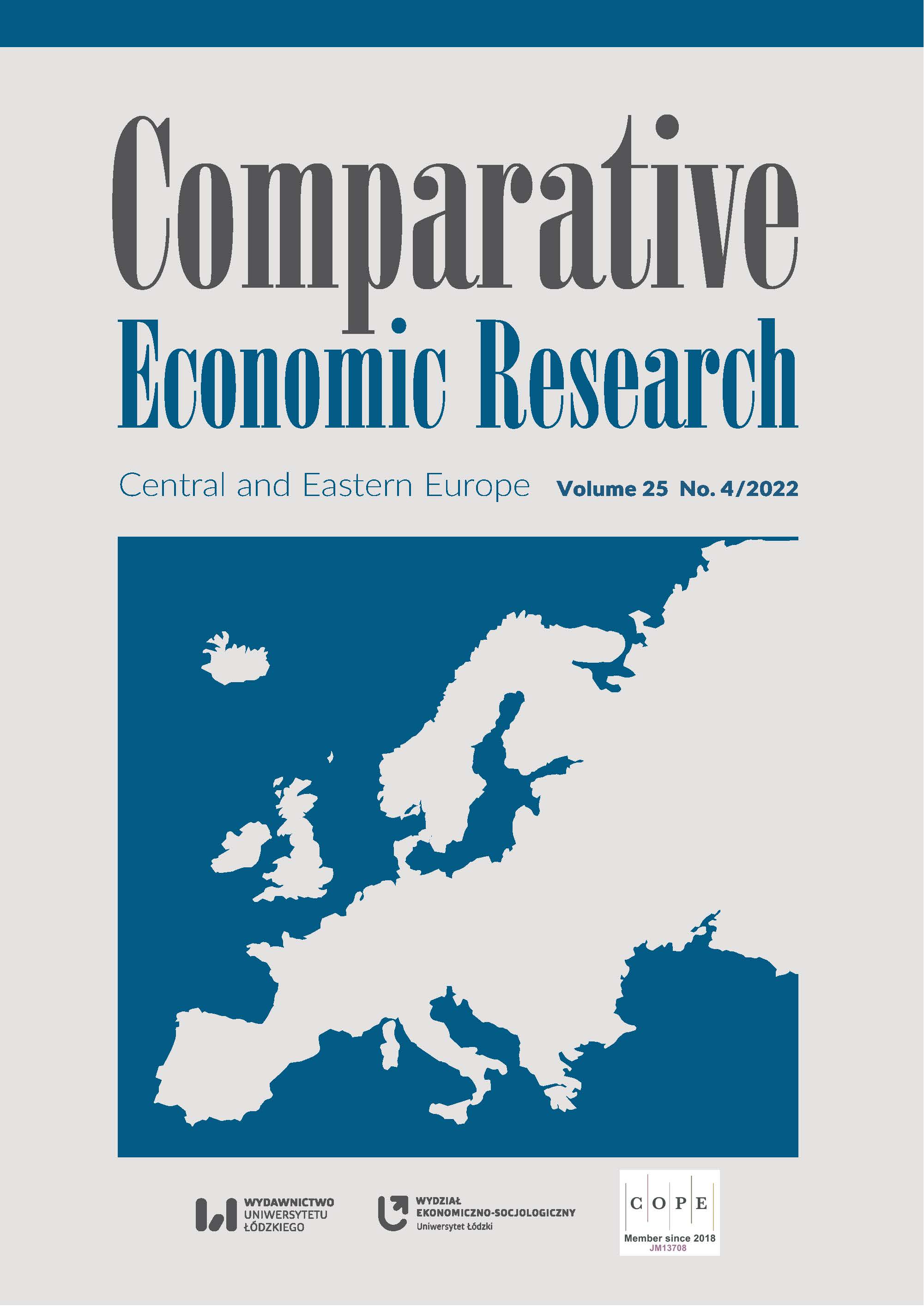Global Income Inequality – A Case Study of OECD Countries and Kazakhstan
DOI:
https://doi.org/10.18778/1508-2008.25.35Keywords:
development, distribution, institutions, transition economy, wealthAbstract
This article presents the results of a study into the features of the formation of economic inequality in Kazakhstan in the context of global trends in the country’s development. The methodological basis of the study was a comparative analysis of the former Soviet Union (FSU) and OECD countries in terms of economic development and inequality in the context of global changes and trends, implemented with the help of econometric and economic‑statistical methods. The study revealed a direct statistically significant (p < 0.05) correlation between the level of income concentration of the 10% group and the economic growth of Iceland (r = 0.67) and the Republic of Belarus (r = 0.65). In the case of the Republic of Kazakhstan, no such correlation was found. However, in Kazakhstan, the link between the 10% group’s income concentration and gross domestic product per capita has been established. The dynamics of GDP growth and the values of Kazakhstan’s population’s real money incomes have a stable inverse relationship. The correlation coefficient between them is r = –0.46, and the determination coefficient is R = 0.215, based on data from 2008 to 2020. This suggests that economic growth is still the most important factor that influences the population’s real income. The results of the study will be put into practice by familiarizing government officials with the developed proposals for enhancing the state’s policy of overcoming economic inequality and setting the stage for sustainable economic growth. In addition, the results of this study will be of interest to academic science, actualizing new directions for further research.
Downloads
References
Aiyar, S., Ebeke, C. (2020), Inequality of opportunity, inequality of income and economic growth, “World Development”, 136, https://doi.org/10.1016/j.worlddev.2020.105115
Google Scholar
DOI: https://doi.org/10.1016/j.worlddev.2020.105115
Breunig, R., Majeed, O. (2020), Inequality, poverty and economic growth, “International Economics”, 161, pp. 83–89, https://doi.org/10.1016/j.inteco.2019.11.005
Google Scholar
DOI: https://doi.org/10.1016/j.inteco.2019.11.005
Bureau of National Statistics of the Agency for Strategic Planning and Reforms of the Republic of Kazakhstan (2021), Basic socio-economic indicators of the Republic of Kazakhstan, https://stat.gov.kz/for_users/dynamic (accessed: 10.06.2021) [in Russian].
Google Scholar
Chancel, L., Piketty, T. (2021), Global Income Inequality, 1820–2020: The persistence and mutation of extreme inequality, “Journal of the European Economic Association”, 19 (6), pp. 3025–3062, https://doi.org/10.1093/jeea/jvab047
Google Scholar
DOI: https://doi.org/10.1093/jeea/jvab047
Čaušević, F. (2017), A Study into Financial Globalization, Economic Growth and (In) Equality, Palgrave Macmillan, Cham, https://doi.org/10.1007/978-3-319-51403-1
Google Scholar
DOI: https://doi.org/10.1007/978-3-319-51403-1
Department of Economic and Social Affairs of the United Nations Secretariat (2020), World Social Report 2020. Inequality in a Rapidly Changing World, https://www.un.org/development/desa/dspd/wp-content/uploads/sites/22/2020/01/World-Social-Report-2020-FullReport.pdf (accessed: 10.06.2021).
Google Scholar
Eurasian Economic Commission (2021), Statistical Yearbook of the Eurasian Economic Union, Eurasian Economic Commission, Moscow.
Google Scholar
Fadda, S., Tridico, P. (2016), Varieties of Economic Inequality, Routledge, London–New York, https://doi.org/10.4324/9781315682099
Google Scholar
DOI: https://doi.org/10.4324/9781315682099
Haller, M., Eder, A. (2016), Ethnic Stratification and Economic Inequality around the World: The End of Exploitation and Exclusion?, Ashgate Publishing, Ltd, Abingdon.
Google Scholar
Jianu, I., Dinu, M., Huru, D., Bodislav, A. (2021), Examining the relationship between income inequality and growth from the perspective of EU member states’ stage of development, “Sustainability”, 13 (9), https://doi.org/10.3390/su13095204
Google Scholar
DOI: https://doi.org/10.3390/su13095204
Josifidis, K., Supic, N., Glavaski, O. (2018), Institutional changes and income inequality: Some aspects of economic change and evolution of values in CEE countries, “Eastern European Economics”, 56 (4), pp. 1–19, https://doi.org/10.1080/00128775.2018.1487265
Google Scholar
DOI: https://doi.org/10.1080/00128775.2018.1487265
Libman, A., Obydenkova, A. (2019), Inequality and historical legacies: Evidence from post-communist regions, “Post-Communist Economies”, 31 (6), pp. 699–724, https://doi.org/10.1080/14631377.2019.1607440
Google Scholar
DOI: https://doi.org/10.1080/14631377.2019.1607440
Meissner, G. (2013), Correlation Risk Modeling and Management: An Applied Guide including the Basel III Correlation Framework-With Interactive Models in Excel/VBA, John Wiley & Sons, Singapore.
Google Scholar
Mijs, J.J. (2021), The paradox of inequality: Income inequality and belief in meritocracy go hand in hand, “Socio-Economic Review”, 19 (1), pp. 7–35, https://doi.org/10.1093/ser/mwy051
Google Scholar
DOI: https://doi.org/10.1093/ser/mwy051
OECD (2019), OECD Under Pressure: The Squeezed Middle Class, OECD Publishing, Paris.
Google Scholar
OECD (2021), Income Distribution Database, OECD.Stat, https://stats.oecd.org/index.aspx?queryid=66670 (accessed: 10.06.2021).
Google Scholar
Remington, T.F. (2019), Income inequality and food insecurity in Russia, “Russian Politics”, 4 (3), https://doi.org/10.1163/2451-8921-00403002
Google Scholar
DOI: https://doi.org/10.1163/2451-8921-00403002
Sethi, D., Acharya, D. (2018), Financial inclusion and economic growth linkage: Some cross country evidence, “Journal of Financial Economic Policy”, 10 (3), pp. 369–385, https://doi.org/10.1108/JFEP-11-2016-0073
Google Scholar
DOI: https://doi.org/10.1108/JFEP-11-2016-0073
Stiglitz, D. (2015), The price of inequality. How the stratification of society threatens our future, Eksmo, Moscow.
Google Scholar
Tokhirov, A. (2021), Remittances and inequality: the post-communist region, “Prague Economic Papers”, 30 (4), pp. 426–448, https://doi.org/10.18267/j.pep.776
Google Scholar
DOI: https://doi.org/10.18267/j.pep.776
United Nations (2019), Sustainable Development Outlook 2019: Gathering storms and silver linings, https://www.un.org/development/desa/dpad/publication/sustainable-development-outlook-2019-gathering-storms-and-silver-linings/ (accessed: 10.06.2021).
Google Scholar
World Bank (2020), Poverty and Shared Prosperity 2020: Reversals of Fortune, World Bank, Washington.
Google Scholar
World Bank Group (2021), World Development Indicators, https://databank.worldbank.org/source/world-development-indicators (accessed: 10.06.2021).
Google Scholar
World Inequality Lab (2021a), The World Inequality Report 2022, https://wid.world/news-article/world-inequality-report-2022/ (accessed: 10.06.2021).
Google Scholar
World Inequality Lab (2021b), World Inequality Database (WID.world), https://wid.world/data/ (accessed: 10.06.2021).
Google Scholar
Yates, M.D. (2016), The Great Inequality, Routledge, London–New York, https://doi.org/10.4324/9781315645841
Google Scholar
DOI: https://doi.org/10.4324/9781315645841
Zubarevich, N.V. (2018), Concentration of the Population and the Economy in the Capitals of Post-Soviet Countries, “Regional Research of Russia”, 8 (2), https://doi.org/10.1134/S2079970518020107
Google Scholar
DOI: https://doi.org/10.1134/S2079970518020107
Downloads
Published
How to Cite
Issue
Section
License

This work is licensed under a Creative Commons Attribution-NonCommercial-NoDerivatives 4.0 International License.











